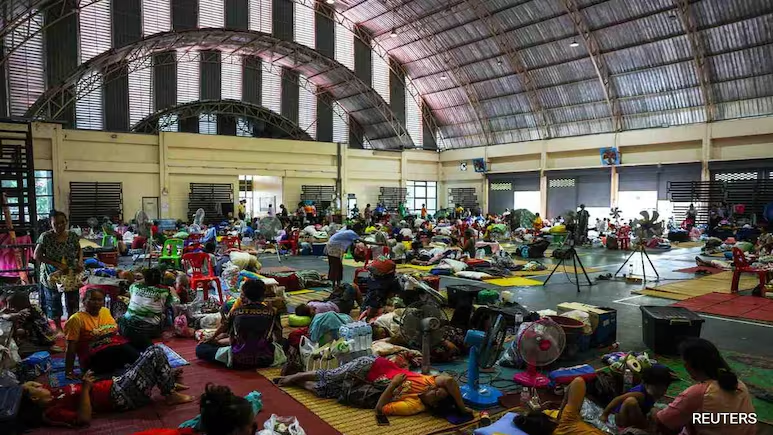After four days of deadly border clashes that have killed at least 34 people and displaced more than 168,000, Thailand and Cambodia have signaled a willingness to enter ceasefire talks—following a warning from U.S. President Donald Trump to stop the war or risk losing trade deals with the United States.
The conflict erupted Thursday when a land mine explosion injured five Thai soldiers near the contested border, triggering artillery exchanges and escalating tensions. Both nations blamed each other for the initial provocation. The situation quickly deteriorated, with Thailand shutting its border crossings and recalling its ambassador. Cambodia responded with similar diplomatic moves.
In a post on his Truth Social platform Saturday, Trump announced he had spoken with both Cambodian Prime Minister Hun Manet and Thailand’s Acting Prime Minister Phumtham Wechayachai, urging an immediate ceasefire. “Thailand, like Cambodia, wants to have an immediate ceasefire, and PEACE,” Trump wrote. He warned both nations that the U.S. would withhold progress on trade relations if the fighting continued.
Cambodia responded quickly, with Hun Manet declaring support for an “immediate and unconditional ceasefire.” He tasked Foreign Minister Prak Sokhonn to coordinate with U.S. Secretary of State Marco Rubio and to open direct talks with Thai officials. “This is positive news for the soldiers and people of both countries,” Hun Manet said.
Thailand acknowledged the effort but expressed caution, stating that peace would require “sincere intention” from Cambodia. Acting Prime Minister Phumtham welcomed talks but emphasized the need for rapid bilateral negotiations to ensure any agreement was substantive and lasting.
Despite the diplomatic breakthrough, fighting continued on Sunday. Thai army officials reported Cambodian forces had fired rockets and artillery into Surin province, hitting civilian homes and targeting disputed areas such as the ancient Ta Muen Thom temple. In response, Thai troops launched long-range artillery strikes. Colonel Richa Suksowanont of the Thai army said battlefield operations would persist until formal negotiations were initiated. “Trump’s efforts are separate from the military situation on the ground,” he noted.
Meanwhile, Cambodia accused Thailand of escalating the conflict. Lieutenant General Maly Socheata of the Cambodian Defense Ministry claimed Thai forces launched a major ground offensive with tanks and artillery, describing it as a “large-scale incursion” that undermined all efforts toward peace. The Thai Foreign Ministry countered that Cambodia was acting in bad faith and violating humanitarian norms.
The human toll is rising. Thai officials report 20 deaths, mostly civilians, while Cambodia has confirmed 13 fatalities. More than 131,000 people have fled their homes in Thailand, with over 37,000 displaced in Cambodia. Entire villages near the border now lie deserted, with schools and hospitals closed.
Ordinary citizens are caught in the crossfire. In Surin province, air-conditioning technician Pichayut Surasit rushed home from Bangkok after hearing of the violence, joining 6,000 evacuees in a local shelter. “I couldn’t stay at work knowing my family was in danger,” he said. Another evacuee, local vendor Bualee Chanduang, arrived at the same shelter with her family and pet rabbit. “I pray for God to help both sides talk and end this war,” she said.
The UN Security Council has called on the Association of Southeast Asian Nations (ASEAN) to help mediate peace. Human Rights Watch has raised alarm over reports of cluster munitions being used in populated areas—calling it a potential violation of international law and urging both sides to protect civilians.
The border between Thailand and Cambodia, spanning 800 kilometers, has been a source of tension for decades. While past skirmishes were brief, the current conflict is one of the most intense in years. A confrontation in May, which left a Cambodian soldier dead, had already strained diplomatic ties and stirred political unrest in Thailand.
Now, with world leaders watching and thousands displaced, hopes are cautiously rising that diplomacy may stop the bloodshed—if words can hold where weapons have failed.

